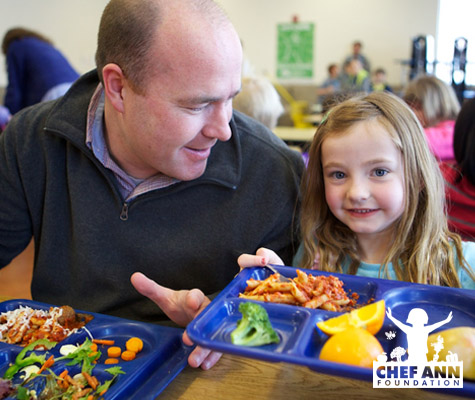
This is a debatable question for sure; one that I used to think was a no-brainer. Yes, if parents are loud enough and demanding enough then eventually it will happen, but that is not the most efficient or pleasant process for either side. The problem is that changing a school food program is no easy feat. In particular, it requires understanding and consideration of many nuances that parents aren’t always aware of up front.
In 2007, when I moved to Boulder, Colorado, I made a point of eating school lunch with my kindergartner. I was shocked by what I saw—French toast sticks (obviously highly processed and nuked) with something that resembled “maple syrup” along with pears in another syrupy sauce. I was thinking I could have just packed her dessert for lunch and it would have been the same thing.
This experience propelled me to try to work with our district to change the school food problem…the problem was: I didn’t know what I didn’t know.
Eventually, we assembled a small group of parents and concerned community members to meet with school district administrators. We did this for over a year without much of a plan or outcome. It really wasn’t anyone’s fault, but we did have a number of stumbling blocks. The most significant was that the current food service director did not embrace our vision for change, and she felt very blamed (particularly by the parents on the committee). This dynamic created a lot of barriers and delays, and ultimately lead us to find alternative solutions, like finding an outside contractor to come in and assess the school food program.
Over time, our work with the district paid off. Namely, we found a real champion for our efforts within the school district’s leadership team, which was a big piece of the puzzle.
Today, seven years later, we have one of the best school food programs in the country. Everything is cooked from scratch, we have salad bars at every school, we serve only organic milk, and just this year we made the switch to hormone- and antibiotic-free meat.
Today, as the Executive Director of the Chef Ann Foundation, I felt we had the opportunity to pay it forward and help support other parents that are trying to navigate school food in their communities. Our foundation has always supported school administrators and food service teams in their journey to change school food, but now it was time to give parents a path too. That’s’ why, over the past year, we committed ourselves to spelling out the steps and actions that can be taken to better work with school districts and start the conversation about school lunch reform. And so became our Parent Advocacy Toolkit.
Our Parent Advocacy Toolkit (sponsored generously by the Whole Kids Foundation) gives parents and community members a place to start and a path to follow. The toolkit provides clear direction in three key areas: Get Educated, Get Organized and Take Action.
Upon reflection of the journey that I took as a parent, I truly feel like I needed to be better educated before starting the conversations with our district. There was so much that I didn’t know, and doing my homework beforehand would have given me better tools for having the discussion. That’s why I strongly suggest starting with the Get Educated section of the toolkit. Here, we have gathered the most important information around school lunch, how it works, where to go for current information, and how to get to know YOUR school lunch program. I love this area because we really culled it down and provided the essentials, whereas searching the Internet can be overwhelming and lead to paralysis.
The Get Organized section is important for going to your district with an organized group that has focused and specific requests, which will garner the most successful outcomes. From general tips about how to form your group, to more specifics like suggested agendas for your first meeting, this area can really help prepare you for your first meeting with your school district and support you in taking a step-by-step approach in moving your agenda forward.
And finally the Take Action area reflects the culmination of your initial work. Setting a meeting with your district is the “action” that you want to focus on here. In the Get Educated and Get Organized sections, you will do a lot of groundwork to prepare for this meeting, but the Take Action area goes further to give you tactical tools to help with the meeting, and provides solution-based ideas to bring to the table.
We are so excited about the NEW Parent Advocacy Toolkit and certainly have to thank Whole Kids Foundation for recognizing the importance of these tools and for sponsoring the work. I am so passionate about this and excited to extend these resources to parents in all communities. Please don’t hesitate to reach out to me directly with questions or suggestions: mara@chefannfoundation.org. Let’s work together to make it happen!
Happy lunching,
Mara Fleishman
Executive Director
Chef Ann Foundation



























